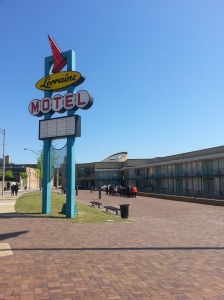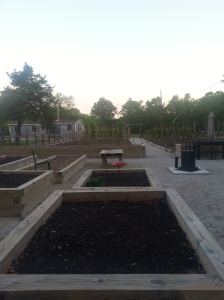I submitted the first draft of residency study to the NPS on April 15 and made my way back to Middle Tennessee shortly thereafter to meet with my committee for my portfolio and dissertation proposal defense. I submitted a twenty-plus page reflection essay, online portfolio, and dissertation proposal to my committee and met with them so they could probe me and test my mettle one more time before they send me off to write my dissertation. Severe thunderstorms rolled through Middle Tennessee that day–the kind of storms that can easily morph into tornadoes. Fortunately no funnel clouds emerged and I passed! Overall, the defense was a pretty enjoyable experience–almost the complete opposite of my oral exams back in August.
Another piece of good news is that MTSU has awarded me the Provost Writing Fellowship. I am so excited that this opportunity will allow me to focus exclusively on my dissertation so I can graduate next May. (POTENTIAL EMPLOYERS: I AM GRADUATING NEXT MAY)
While I was yammering during my defense, I received an email from the George Wright Society informing me that the digital issue of the Forum is available. This particular issue has my paper on New Deal parks that I presented in March 2013. Conference attendance was decimated that year because of travel limitations for federal employees so I am glad my paper has a second life in the journal. Later in the week, my good friends at Living Landscape Observer published my guest piece, “Observing the War on Poverty on the Landscape.” You can find both articles and my dissertation abstract in my brand new “Landscape Writings” section.
May is National Preservation Month. To celebrate preservation and being back in the Volunteer State, I traveled to Germantown for the Tennessee Preservation Trust conference, May 1-2. This was my first time visiting the Memphis area and attending this particular conference. I drove down early to visit the National Civil Rights Museum at the Lorraine Hotel. The museum recently re-opened after a sixteen month, $27.5 million renovation. I had only one word for my experience: overwhelming. The scholarship was outstanding. The exhibit design and artifacts were powerful. I felt that I read a book on the Civil Rights movement by the end and that I had gone on some national Civil Rights driving tour, but really I was only in one place for three hours. Fortunately, Central BBQ is right next door so I could reflect over a half rack of ribs.
All the speakers were expert storytellers, which made the conference far more engaging had they been focused on just bricks and mortar. I am so glad to see that preservationists truly care about the character and significance of these sites rather than just focusing on the “pretty buildings.” Also, their ability to communicate these values through engaging narratives is truly impressive. Here are few projects/organizations/people highlighted during the conference that are worth checking out.
- Bobby Lanier Farm Park in Germantown is a new community project that teaches sustainable agriculture while weaving in the area’s agricultural heritage in a growing urban area.
- Dr. Michael Birdwell talked about the World War I centennial in Tennessee and is trying to compile stories of county histories of the war. Here is an exhibit from the Tennessee State Museum.
- Alex Ginsberg, photographer, talked about his growing business in photograph restoration.
- Deborah York, descendant of Sergeant Albert C. York and Executive Director of the Sergeant York Patriotic Foundation, described her organization’s attempts to save the York Institute from demolition.
- June West of Memphis Heritage described the legal battle over the 19th Century Club. Sounds like an excellent case study of Historical Administration classes of how not to handle finances in a non-profit.
- West briefly mentioned a fascinating project in which Memphis Heritage is trying to help the Memphis Comic and Fantasy Convention preserve Ashlar Hall.
- David Currey discussed the Tennessee Preservation Trust’s decision to help preserve the Highlander Folk School in Monteagle with the intention of turning it over to another non-profit. The property’s history encompasses the social gospel, labor, and civil rights movements.
- Elaine Taylor, a participant in the Memphis civil rights movement, spoke about her decision to start a heritage tour company in Memphis to teach children (and adults) their history. She credits knowing her family’s painful past for giving her the strength and courage to participate in the civil rights movement.
I plan to remain in Middle Tennessee throughout the summer to complete the bulk of my dissertation research while also revising my residency study. I hope this post is an indication of how I plan to remain engaged with the public and professional organizations during what can be a pretty isolating time.


